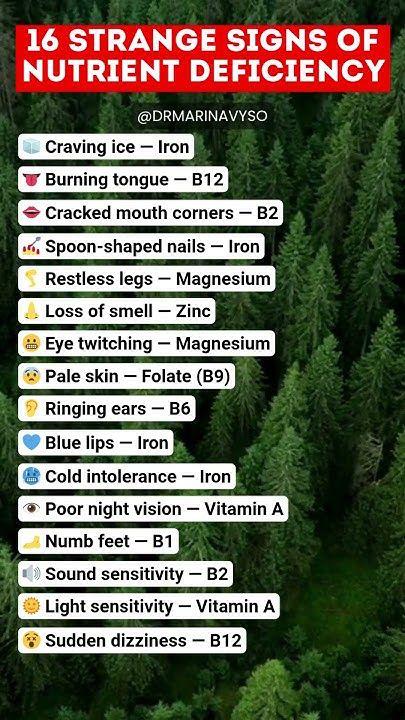You wake up craving ice, your eyes twitch during long hours at work, or your skin seems paler than usual. At first glance, these quirks appear harmless. Yet nutrition experts warn that such subtle signs may signal something deeper: nutrient deficiencies silently shaping your health.
When the Body Sends Unusual Signals
Doctors say the human body often sends out early alarms long before diseases appear. The challenge is recognizing them.
- Craving ice, spoon-shaped nails, blue lips, cold intolerance → Common red flags for iron deficiency anemia, a condition that affects oxygen transport in the blood.
- Burning tongue, sudden dizziness, numb feet → Could be signs of Vitamin B12 deficiency, often tied to nerve health.
- Cracked mouth corners, sound sensitivity → Associated with Vitamin B2 (riboflavin) deficiency.
- Eye twitching, restless legs → Linked to low magnesium, which plays a role in nerve and muscle function.
- Loss of smell → Sometimes rooted in zinc deficiency.
- Pale skin → A hallmark of Folate (Vitamin B9) deficiency, which disrupts red blood cell production.
- Ringing ears → May suggest Vitamin B6 deficiency.
- Poor night vision, light sensitivity → Clear markers of Vitamin A deficiency, which affects the retina.
Why Deficiencies Are Rising
Despite improved global food supply, micronutrient deficiencies remain widespread. The World Health Organization estimates that more than 2 billion people worldwide suffer from a lack of key vitamins and minerals.
Nutritionists cite three primary causes:
- Dietary habits — Processed foods rich in calories but poor in nutrients.
- Modern lifestyle — Stress, irregular meals, and reduced exposure to sunlight (for Vitamin D).
- Medical conditions — Malabsorption issues, restrictive diets, or long-term medication use.
The Risks of Ignoring Them
Left untreated, these deficiencies can escalate into serious conditions. Iron deficiency can progress to chronic anemia, Vitamin A deficiency to impaired vision, and B12 deficiency to irreversible nerve damage.
“Deficiencies don’t always start with fatigue or weakness — sometimes they whisper through unusual signs,” said Dr. Rina Sharma, a clinical nutritionist in New Delhi. “By the time people recognize them, the damage may already be advanced.”
The Way Forward
Health experts recommend:
- Diversified diet: Whole grains, green leafy vegetables, fruits, dairy, nuts, and lean proteins.
- Regular health screenings: Blood tests for hemoglobin, Vitamin B12, Vitamin D, and other markers.
- Targeted supplementation: Under medical advice, especially for high-risk groups like vegetarians, pregnant women, and the elderly.
The Takeaway
Your body has its own vocabulary. A craving, a twitch, or a sudden dizzy spell may not be random quirks but coded messages pointing to what’s missing in your diet. Listening early — and seeking medical advice — could be the difference between quick recovery and long-term illness.


